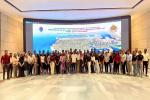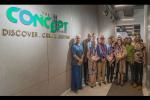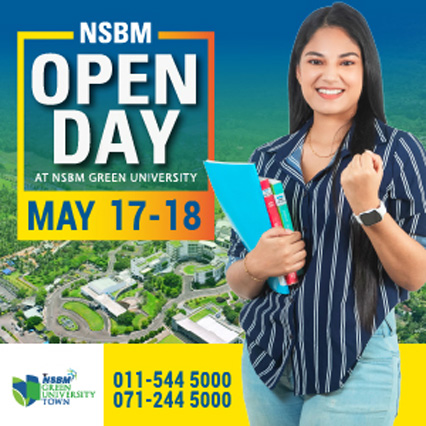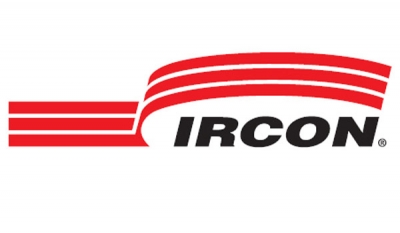IRCON was responsible for the upgradation of the Tsunami devastated coastal railway line and the reconstruction of the Northern Province railway tracks which tremendously helped in the capacity enhancement of the Sri Lanka Railway.
The restoration of rail lines in the Northern Province reestablished rail connectivity to Colombo after a lapse of 30 years which has been a boon for the people of the North as well as the overall economic development of Sri Lanka.
Speaking at a Press Conference on the occasion of commemorating IRCON's glorious presence in Sri Lanka, Project Director Mr. S L Gupta, said that IRCON started its Sri Lanka charter with the mandate to upgrade the Kalutara – Galle - Matara coastal railway line in March 2009.
“The Coastal Railway Line was devastated during the Tsunami in December 2004.
The project involved the rehabilitation and improvement of the existing track to a modern railway track with a speed potential of 100 kmph.
This 114 km long project was funded through an Indian line of credit having soft terms and was completed ahead of schedule in two phases.
Phase-I, Galle – Matara (42 km) was completed and handed over to Sri Lanka Railways on 16th February 2011, while Phase-II, Galle – Kalutara (72 km) was put to commercial operations on 19th April 2012”.
Mr. Gupta said that Govt. of Sri Lanka invited IRCON to submit techno commercial proposal for reconstruction of Northern Province Railway Lines where the ethnic war was just concluded.
Thereafter, the then President of Sri Lanka visited India in June 2010 and through a Joint Declaration, Indian Govt. announced that they would extend Line of Credit of USD 800 Million for the restoration of the railway lines and the installation of the signaling and telecommunication system in the Northern Province.
“The Line of Credit is a very soft loan with interest rate of LIBOR plus 0.5%.
There is 20 year repayment period with a 5 year moratorium”.
IRCON then proceeded to undertake the reconstruction of 265 km of the Northern Railway lines in Sri Lanka, funded by the Government of India Lines of Credit in stages with the first segment of the Northern Railway Line, namely the re-constructed railway track from Medawachchiya to Madhu Road, being handed over to the Government of Sri Lanka on 14th May 2013”.
Gupta went on to say that the second segment from Omanthai to Kilinochchi was inaugurated on 14th September 2013 by President of Sri Lanka, undertaking a train journey in the famous Yaldevi.
Subsequently the Kilinochchi to Pallai section was handed over for commercial operations on 04th March 2014.
“The long awaited dream of reconnecting Jaffna with Colombo via rail and recommencing services of the famous Yal Devi to Jaffna was achieved with the opening of the Pallai – Jaffna section on 13th October 2014; thereafter the stretch from Jaffna to KKS was inaugurated for train services on 02nd January 2015 in record time”.
The last and final segment of the Northern Railway Line from Madhu Road to Talai Mannar Pier (63 Kms) was inaugurated on 14th March 2015 by the Prime Minister of India.
As part of the Northern Railway projects, IRCON has also handed over six new locomotives to Sri Lanka Railways.
The installation of the Signaling and Telecommunication system in the sections has also been completed and commissioned with the opening of sections, while the new railway tracks are designed with a speed potential of 120 kmph.
Mr Gupta went on to say that the rail joints have been replaced using state of the art welding technology, while latest technologies such as Pre-stressed Concrete sleepers, CMS (Cast Manganese Steel) crossings with standard turnouts, Long Welded Rails with Switch Expansion joints, modern Signaling and Telecommunication system, mechanized Tamping and Packing etc. have been incorporated to provide a long lasting track, with minimal maintenance efforts.
The maintenance effort is reduced to 50% in this modern track compared to available conventional tracks in Sri Lanka.
“IRCON not only executed the projects but also imparted various technical and managerial training skills to personnel from Sri Lanka Railways and the CECB who were associated with the projects.
This training is very beneficial to persons from Sri Lanka in maintaining the railway track standards of long welded rails (LWRs)”, said Gupta.
During the execution of these projects, IRCON made use of local manpower as well as agencies, thus providing huge employment opportunities as well as skills development for local personnel, said Mr Gupta.
Besides the enormous benefits being reaped by the public of Sri Lanka due to the restoration of Rail connectivity between the Northern and the Southern parts of the country, the Govt. of Sri Lanka acting through the Ministry of Internal Transport is also earning huge revenues by way of sales of travel tickets.
“It is learnt that the Yal Devi train is running full, with bookings being done several days in advance", said Gupta.
As a few projects are still under warranty period, IRCON has been maintaining adequate resources to meet its Defect Liability Period obligations.
Apart from reconstructing the railway lines, IRCON is actively involved in a variety of CSR projects in Sri Lanka as well.
IRCON focuses on CSR initiatives where there is value creation in the longer term, demonstrating its commitment and respect to all its stakeholders.
IRCON’s social commitments are carried out in five key focus areas, namely education, health, community development, generation of self-employment and empowerment of women.
Various CSR activities carried out in the Northern and Western Provinces have resulted in IRCON becoming an integral part of the community in which it operates in.
Under the CSR initiative, IRCON has so far completed construction of two health units with ambulance facilities at Medawachchiya and Mankulam, the renovation of the community hall at Talaimannar, construction of a community hall at Matugama, seating benches for railway stations of the coastal line, distribution of computers and computer furniture to underprivileged schools at Matugama, distribution of bicycles for women and students in the Vavuniya district and construction of a vocational training centre at Matugama, development of a playground-cum-community gathering place at Palinda Nuwara, and the provision of school kits for 5,000 under-privileged children etc.
“The timely execution and high-quality of work provided by IRCON has been widely appreciated in Sri Lanka.
We at IRCON have played a significant role in Sri Lanka’s railway infrastructure development by mobilizing huge fleets of machinery and manpower for the restoration of the railway lines in the Northern Province.
With the completion of the Northern Province railway lines, IRCON is very keen to assist Sri Lanka Railways in any of its future infrastructure development projects in line with the priorities of the railway transport sector”, said Mr Gupta.
IRCON by timely completion of railway projects has significantly contributed to the bilateral relations of the two countries as it has enhanced the mutual trust and paved the way for further partnership in the area of infrastructure development, particularly in the Northern Province of Sri Lanka.
Completion of the Northern Province rail projects has benefitted the Tamil diaspora in many ways and this also has been a major factor for restoring normalcy to the war affected region which has been of major concern to India.
Mr. Gupta also expressed his appreciation to the Government of Sri Lanka for giving IRCON the opportunity to work in Sri Lanka.
Gupta further added that the Government of Sri Lanka should make all efforts to ensure that the trains can cover the distance from Colombo to Jaffna and Colombo to Trincomalee in 4 to 4.5 hours.
“It is also of paramount importance that every Government should leave no stone left unturned to develop rail transport as it is the most fuel efficient, safe, customer and environmental friendly mode of transport, ensuring all round development of the country”, said Gupta.























